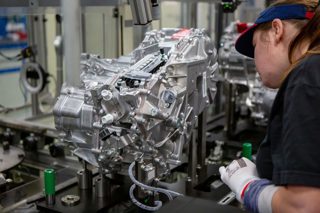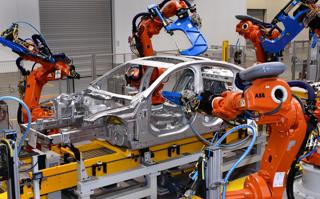Britain’s ability to compete as an electric vehicle (EV) production leader is at risk unless the Government responds to increasingly fierce international competition from abroad, the Society of Motor Manufacturers and Traders (SMMT) warns.
A new blueprint published today highlights efforts by other countries to power up political and economic backing for their own automotive sectors, positioning themselves at the front of the queue for investment.
Mike Hawes, SMMT chief executive, said: “Britain boasts a firm foundation of EV production, backed by low carbon energy, outstanding R&D and a highly skilled and productive workforce. We must not squander these advantages. With other parts of the world turbocharging their support for the zero emission vehicle transition, we need to step up to compete in this global race. Every part of the country has a stake in the switch and with fast, decisive action we can deliver for Britain the growth, jobs and green prosperity this country deserves.”
Race to Zero: Powering Up Britain’s EV Supply Chain sets out the UK’s intrinsic strengths in advanced automotive manufacturing, low carbon energy and R&D, but stresses the need for an urgent response to initiatives such as the US $370 billion Inflation Reduction Act and EU Green Deal Industrial Plan.
The blueprint sets out a Green Automotive Transformation strategy that would position Britain as one of the world’s most competitive locations for advanced automotive manufacturing, matching its world-leading market ambition to end the sale of non-zero emission cars and vans in 2035.
The strategy identifies investment, regulation and trade as the key pillars to anchor future vehicle production in Britain. De-risking private capital with more competitive incentives and action on energy costs, with support for the next British ‘unicorns’ in batteries and renewables, will stimulate greater investment in EV enterprises. Reform of regulation will accelerate delivery of new production facilities and renewable energy generation. Maximising trade opportunities, meanwhile, would help secure access to essential raw materials. Such moves will secure the essential gigafactories which can underpin EV production.
To date, more than £11 billion has been invested by manufacturers in EV production locally, leading to fully electric or hybrid vehicles comprising almost a third of all UK-built cars last year, with an export value of £10 billion. By 2025, the sector is anticipated to produce more than 20 models of electric cars, vans, buses and trucks, contributing to the economy and jobs in all regions of the country.
Meanwhile, every part of the UK contributes to the EV supply chain, with a 25% increase in the number of these businesses in the last five years.
Richard Peberdy, UK head of Automotive for KPMG, said: “Some countries, like the USA in the form of its Inflation Reduction Act, have developed bold policy moves to encourage inward investment in next generation manufacturing facilities for the electric vehicle supply chain - and these are proving effective at securing big bet investments from car makers. At present, the UK is proving a less attractive proposition for new vehicle manufacturing facilities. It’s imperative for the future of the UK car industry and its related employment and exports, that industry and government jointly address how the UK can be as globally competitive as possible.”





















Login to comment
Comments
No comments have been made yet.